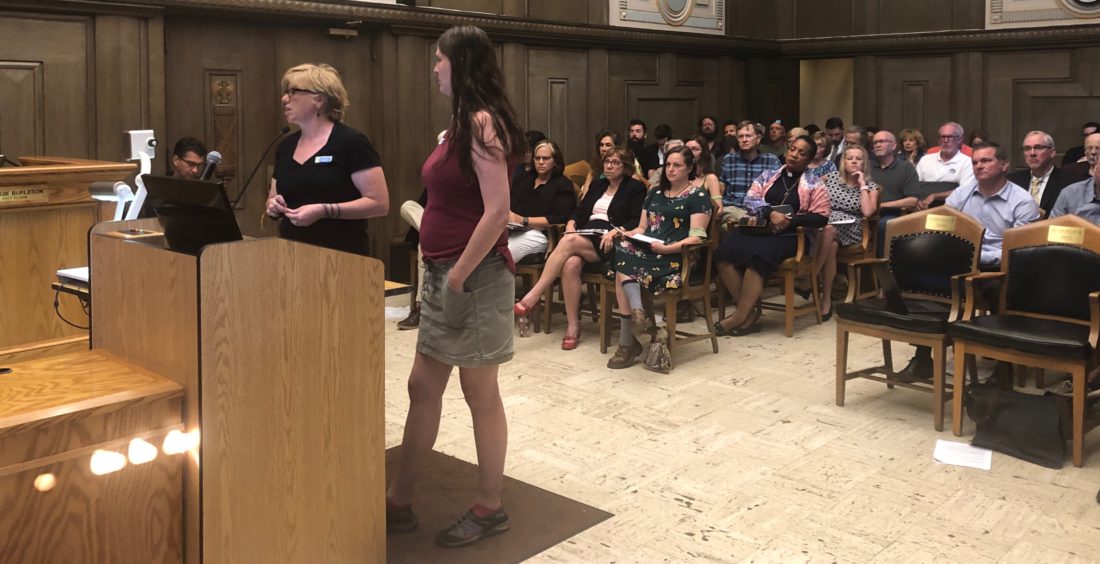Transit, tree protection and city employee wages were among the issues that brought more than 100 people — filling Council chambers and two overflow rooms — to the May 28 public hearing on Asheville City Council’s proposed 2019-20 budget.
City Manager Debra Campbell opened the hearing by providing a budget overview to Council members and highlighting what she felt were two of its most controversial aspects: city employee pay raises and first-phase funding for the city’s Transit Master Plan.
The proposed budget recommends only partial funding for the plan’s first year but still represents a 30% increase in the city’s subsidy for transit over fiscal year 2018-19. The $1.56 million added to the transit budget will make up for a $359,000 reduction in federal grant revenue, as well as support an additional 20,000 service hours through the creation of new routes and realignment of existing ones. The budget would also fund a bus maintenance facility study and add six new staff members to improve the rider experience.
Many community members who spoke during public comment, however, expressed frustration at what they described as an unreliable transit system inadequate for Asheville’s size.
“I’ve spent a lot of time at the bus station the past week and I’ve seen workers in their uniforms going to Burger King and the Grove Park Inn and Delta at the airport, and all these folks said the same thing to me: ‘Transit can’t wait,’” said Rev. Amy Cantrell, an organizer with local transit advocacy group Better Buses Together. Cantrell also heads BeLoved Asheville, whose clientele largely depends on public transportation. “They are dying trying to make things work, trying to survive, and they’re spending money just trying to get home from their jobs.”
Fully funding the plan’s first year would extend all bus routes to run until 10 p.m. Monday-Saturday and 8 p.m. on Sunday, adding approximately two hours to existing service times. The proposed transit budget includes $1.2 million toward phase one of the plan but falls short of the $3.7 million that management company RATP Dev estimates it would need for full implementation. The city’s Transit Committee and Multimodal Transportation Commission most recently recommended that Council allocate $1.85 million toward implementing the phase one of the plan with the changes set to take place in January, 2020, thus representing a half-year’s worth of additional spending.
“I know that people want more, but I want our transit system to run efficiently. I want it to have the kind of impact that everybody wants in this community,” Campbell said. “We just need a little bit more time, and obviously we need more resources to do that.”
Campbell also responded to concerns raised by Council member Keith Young on May 14 during her budget presentation about a proposed 2.5% city employee pay raise. Young had suggested raising all city employees to a base pay level of $15 per hour instead of funding an across-the-board raise during the current budget cycle.
Campbell said she was open to identifying the costs of paying employees an annual salary of $31,200, which is equivalent to $15 per hour based on a 40-hour workweek. She asked that city staff and consultants complete a proposed class and compensation study to analyze the impacts of wage compression and pay increases; she would then implement pay raises during the upcoming budget cycle if recommended by staff.
“I think everybody up here would want to pay everybody as much as we can pay them and I think everybody up here wants to expand transit as fast and as much as we can. Sadly, in both of those situations, there are very real limitations that don’t allow us to do that,” said Council member Julie Mayfield.
A number of residents also drew attention to the budget’s lack of funding for protection of the city’s urban forests — the trees dotted among Asheville’s streets, parks, natural areas and homes. Cathy Walsh, a member of the city Tree Commission’s Tree Protection Task Force, described urban forests as a “major component in the fight against climate change.
“Asheville has lost 8%-10% of its tree canopy; that’s 1,600 acres of trees that have been lost in the past 10 years. We have no plans to replace these at this point,” Walsh continued. “There could be an enormous cost to the city and to its citizens and wildlife if we lose the urban forest and canopy.”
Walsh recommended the city dedicate funds to develop an Urban Forest Master Plan, which would guide Asheville toward its green infrastructure goals and add an urban forester position. The estimated upfront cost of adding an urban forester is $104,205, with plan development estimated at $250,000. No Council members commented on these proposals during the hearing.
Council members are slated to vote on adoption of the proposed budget at their regular meeting on Tuesday, June 11, at 5 p.m. in Asheville City Hall. The full proposed budget is available at avl.mx/64l.




Our city is doomed if transit, urban trees and $15 wages are what we are dealing with. So many real world problems out there.